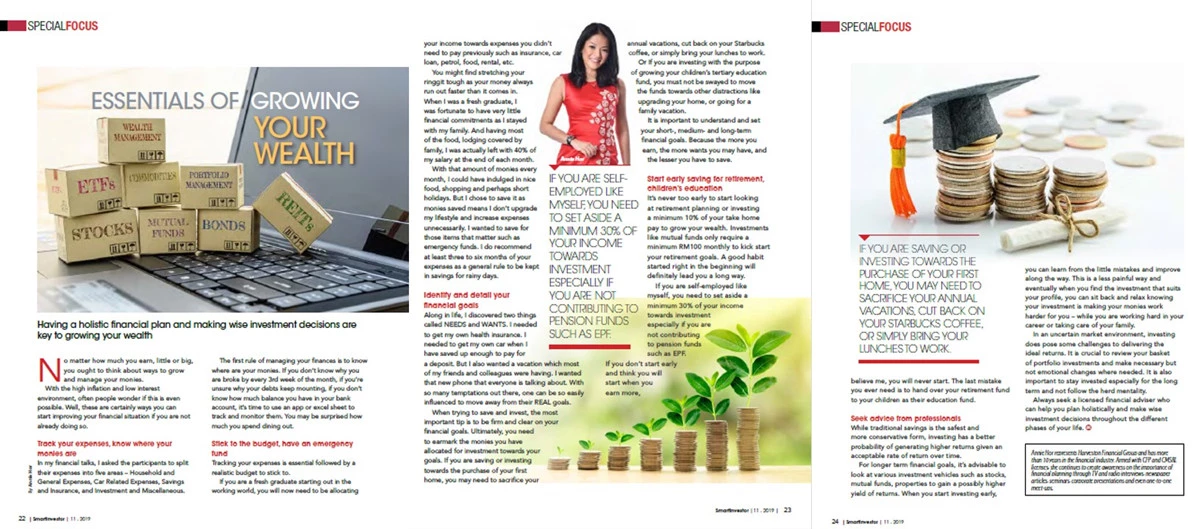This article first appeared in Smart Investor – Special Focus, on November 2019.
No matter how much you earn, little or big, you ought to think about ways to grow and manage your monies. With the high inflation and low interest environment, often people wonder if this is even possible. Well, these are certainly ways you can start improving your financial situation if you are not already doing so.
Track your expenses, know where your monies are
In my financial talks, I asked the participants to split their expenses into five areas – Household and General Expenses, Car Related Expenses, Savings and Insurance, and Investment and Miscellaneous. The first rule of managing your finances is to know where are your monies. If you don’t know why you are broke by every 3rd week of the month, if you’re unsure why your debts keep mounting, if you don’t know how much balance you have in your bank account, it’s time to use an app or excel sheet to track and monitor them. You may be surprised how much you spend dining out.
Stick to the budget, have an emergency fund
Tracking your expenses is essential followed by a realistic budget to stick to. If you are a fresh graduate starting out in the working world, you will now need to be allocating your income towards expenses you didn’t need to pay previously such as insurance, car loan, petrol, food, rental, etc. You might find stretching your ringgit tough as your money always run out faster than it comes in. When I was a fresh graduate, I was fortunate to have very little financial commitments as I stayed with my family. And having most of the food, lodging covered by family, I was actually left with 40% of my salary at the end of each month. With that amount of monies every month, I could have indulged in nice food, shopping and perhaps short holidays. But I chose to save it as monies saved means I don’t upgrade my lifestyle and increase expenses unnecessarily. I wanted to save for those items that matter such as emergency funds. I do recommend at least three to six months of your expenses as a general rule to be kept in savings for rainy days.
Identify and detail your financial goals
Along in life, I discovered two things called NEEDS and WANTS. I needed to get my own health insurance. I needed to get my own car when I have saved up enough to pay for a deposit. But I also wanted a vacation which most of my friends and colleagues were having. I wanted that new phone that everyone is talking about. With so many temptations out there, one can be so easily influenced to move away from their REAL goals. When trying to save and invest, the most important tip is to be firm and clear on your financial goals. Ultimately, you need to earmark the monies you have allocated for investment towards your goals. If you are saving or investing towards the purchase of your first home, you may need to sacrifice your annual vacations, cut back on your Starbucks coffee, or simply bring your lunches to work. Or if you are investing with the purpose of growing your children’s tertiary education fund, you must not be swayed to move the funds towards other distractions like upgrading your home, or going for a family vacation. It is important to understand and set your short-, medium- and long-term financial goals. Because the more you earn, the more wants you may have, and the lesser you have to save.
Start early saving for retirement, children’s education
It’s never too early to start looking at retirement planning or investing a minimum 10% of your take home pay to grow your wealth. Investments like mutual funds only require a minimum RM100 monthly to kick start your retirement goals. A good habit started right in the beginning will definitely lead you a long way. If you are self-employed like myself, you need to set aside a minimum 30% of your income towards investment especially if you are not contributing to pension funds such as EPF. If you don’t start early and think you will start when you earn more, believe me, you will never start. The last mistake you ever need is to hand over your retirement fund to your children as their education fund.
Seek advice from professionals
While traditional savings is the safest and more conservative form, investing has a better probability of generating higher returns given an acceptable rate of return over time. For longer term financial goals, it’s advisable to look at various investment vehicles such as stocks, mutual funds, properties to gain a possibly higher yield of returns. When you start investing early, you can learn from the little mistakes and improve along the way. This is a less painful way and eventually when you find the investment that suits your profile, you can sit back and relax knowing your investment is making your monies work harder for you – while you ar e working hard in your career or taking care of your family.
In an uncertain market environment, investing does pose some challenges to delivering the ideal returns. It is crucial to review your basket of portfolio investments and make necessary but not emotional changes where needed. It is also important to stay invested especially for the long term and not follow the herd mentality. Always seek a licensed financial adviser who can help you plan holistically and make wise investment decisions throughout the different phases of your life.
To find out more, please contact us at 010 209 3299 or drop your message at https://harveston.com.my/contact-us



 We would like to bring to your attention that the name Harveston is being used for fraudulent purposes. We have received reports that scammers are using our name to deceive people and engage in misleading activities.
We would like to bring to your attention that the name Harveston is being used for fraudulent purposes. We have received reports that scammers are using our name to deceive people and engage in misleading activities.